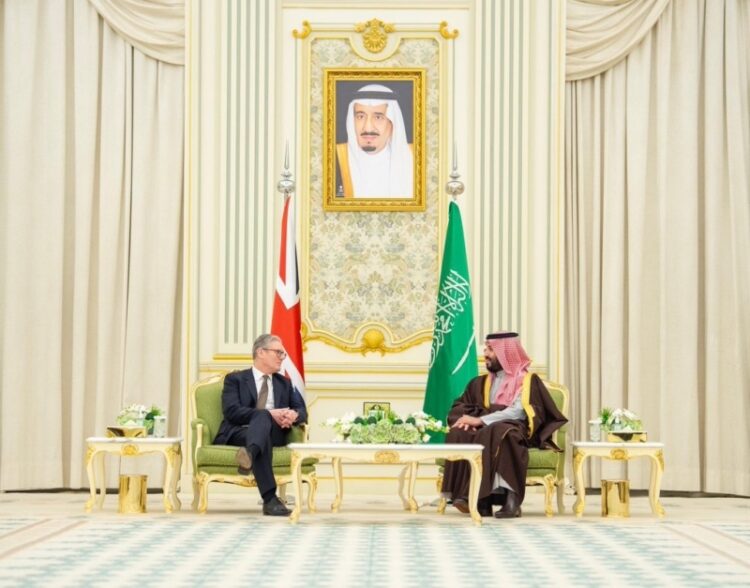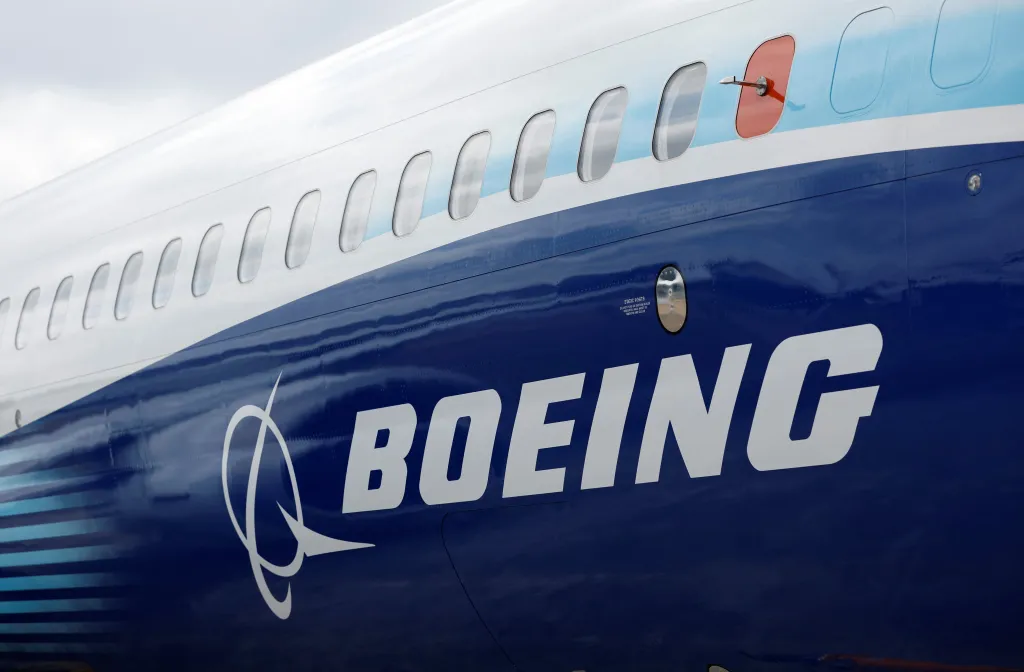Publisher: Maaal International Media Company
License: 465734
The Kingdom, Britain confirm their commitment to increasing bilateral trade to $37.5 billion by 2030
Saudi Arabia and the United Kingdom emphasized the importance of strengthening the economic partnership between the two kingdoms, and reaffirmed their commitment to increasing bilateral trade to £30bn by 2030.
This was stated in the joint statement issued at the conclusion of the visit of Prime Minister of the United Kingdom of Great Britain and Northern Ireland Keir Starmer to the Kingdom of Saudi Arabia, the text of which is as follows:
“Based on the distinguished relations between the Kingdom of Saudi Arabia and the United Kingdom, the Prime Minister, the Rt. Hon. Sir Keir Starmer MP, paid an official visit to the Kingdom of Saudi Arabia on Monday, December 9, and was received by His Royal Highness Prince Mohammed bin Salman bin Abdulaziz Al Saud, Crown Prince and Prime Minister.
اقرأ المزيد
The two sides stressed the importance of the role played by the Saudi-UK Strategic Partnership Council in enhancing joint cooperation between the two countries. They also expressed their aspiration to hold the next session of the council when they meet next in the United Kingdom.
The two sides reviewed the extensive progress made in modernising and diversifying the bilateral relationship and agreeing an ambitious programme of cooperation to enhance mutual prosperity, to strengthen shared security and to tackle global challenges.
Enhancing Mutual Prosperity
The two sides acknowledged the vital importance of strengthening the economic partnership between the two Kingdoms and reaffirmed their commitment to grow total trade to £30bn by 2030 and to increase investment into both Kingdoms. Through Saudi Arabia’s Vision 2030 and the United Kingdom’s Industrial Strategy, both countries are investing in industries of tomorrow that will drive future global competitiveness; deliver jobs and prosperity for our citizens; and deliver sustainable growth.
The two sides welcomed significant progress made on the GCC-UK Free Trade Agreement. Officials will continue intense negotiations to finalise the agreement as soon as possible.
Both sides commended the growth of the two-way investment relationship, noting significant Saudi investments in the United Kingdom in 2024. These include PIF’s investments in Selfridges and Heathrow Airport, as well as the fund’s additional investment in Newcastle United Football Club, further building the growing ties between the North East of England and Saudi Arabia. The United Kingdom continues to be one of the largest foreign investors in Saudi Arabia. Building on the success of its landmark approx. $700mn Shariah-compliant financing facility in Qiddiya earlier this year, UK Export Finance announced plans to increase its market exposure to $6bn.
The two sides commended the existing cooperation between the two countries in the energy sector and stressed the importance of enhancing cooperation in electricity and renewable energy, clean hydrogen and its applications. This includes focusing on the development of policies, regulations, and standards for clean hydrogen, clean hydrogen business models, as well as capacity building as a key enabler for successful multilateral cooperation in the clean hydrogen sector.
Both sides stressed the importance of enhancing the reliability of global supply chains, particularly with the launch of Saudi Arabia’s Global Supply Chain Resilience Initiative securing supplies for various global supply chains, especially in areas such as renewable energy, hydrogen production, green minerals, specialized petrochemicals, waste recycling, and electric vehicles. Both sides also welcomed the Kingdom’s launch of five special economic zones, targeting strategic industries and sectors, and offering British companies the opportunity to benefit from the advantages and incentives provided by the zones at all levels of supply chains and across various sectors.
They affirmed their commitment to enhancing cooperation in the fields of clean technology, energy innovation, and sustainability, contributing to sustainable economic growth and the development of commercial partnerships between the two countries. Both sides expressed their aspiration to develop long-term strategic partnerships that serve mutual interests. They agreed to work together to establish a consortium for Clean Hydrogen between Saudi and British universities led by Newcastle University and King Fahd University of Petroleum and Minerals.
The two sides underscored the importance of strengthening bilateral cooperation in the financial services sector, including banking, fintech, asset management, green finance, and insurance.
The two sides agreed to continue strengthening cooperation on critical minerals and mining to support responsible, diversified and resilient supply chains, including a partnership between the University of Exeter’s Cambourne School of Mines and the Saudi Mineral Innovation Acceleration Park. They agreed to strengthen cooperation on developing our sustainable mining sectors and diversifying the supply of rare minerals for clean technologies. The United Kingdom reaffirmed its support for and its planned high-level attendance at the Saudi Future Minerals Forum in January 2025.
The two sides stressed the centrality of the UN Framework Convention on Climate Change and the Paris Agreement, acknowledging the outcomes of COP29 and the importance of working in a constructive spirit to achieve an ambitious and balanced result at COP30 next year. The United Kingdom welcomed Saudi Arabia’s ambition and leadership through the Saudi Green Initiative and Middle East Green Initiative and its presidency of the UN Convention to Combat Desertification 16th session of the Conference of the Parties COP16 and expressed support for Saudi Arabia’s efforts in the fields of environment and climate change through the implementation of the Circular Carbon Economy approach, which was launched by the Kingdom and endorsed by G20 leaders.
People-to-People Links and Supporting Vision 2030
The United Kingdom reaffirmed its strong support for Saudi Arabia’s Vision 2030 and commitment to the opportunities it presents for the bilateral partnership. The two sides welcomed the rapidly growing number of visitors between the two Kingdoms and looked forward to these increasing further following the recent announcement of new air links and easing of visa requirements on both sides.
Both sides agreed on the importance of enhancing cultural cooperation across various cultural sectors under the framework of the Memorandum of Understanding signed between the two Kingdoms. This includes strengthening collaborative initiatives among cultural institutions and organizations, as well as supporting participation in international cultural and artistic events held in the two countries.
Both sides agreed to exchange expertise on heritage and museums infrastructure, including through the launch of a new executive programme to strengthen United Kingdom engagement in Saudi Arabia’s development of AlUla. A further partnership has been agreed between the Royal Commission for AlUla and the British Council as the organization marks its 90th anniversary. This will accelerate the UK’s collaboration with Al Ula through culture, training, and research.
In education, the two sides commended the outcomes of the strategic collaboration between the two countries in pre-tertiary and tertiary education and training. Both countries welcomed strategic plans to increase the number of UK-branded schools in Saudi Arabia to reach a target of 10 schools by 2030, and open overseas branches of UK universities in Saudi Arabia to support Saudi Arabia’s vision of creating a knowledge-based economy driven by excellence in education. In addition, the two sides are committed to continuing the discussions to increase the collaboration in Special Educational Needs and Disabilities (SEND) and in Technical and Vocational Education and Training (TVET).
On health, the two sides committed to driving increased healthcare collaboration to benefit patients in both countries, including through joint initiatives to support the training of nurses. There are ongoing discussions between UK universities and potential Saudi partners on the establishment of a nurse training college in the Kingdom. The two sides also reaffirmed their shared commitment to advancing global health and addressing cross-border health challenges.
The two sides recognised the opportunity to increase cooperation on food safety and agri-food trade and agreed that the United Kingdom and Saudi Arabia would cooperate further.
The two sides agreed to promote sports between British and Saudi organisations, with a particular focus on sports programs, and female participation. They endorsed a joint project between British and Saudi universities supporting the development of future female leaders in sport. They also commended the growing partnership between the two countries in esports.
Strengthened Shared Security
Building on decades of bilateral defence and security cooperation, the two sides committed to a more ambitious, future facing strategic Defence partnership. This will support the evolution of our relationship into a modern partnership – anchored in industrial collaboration and capability development, with increased interoperability and cooperation on shared threats in pursuit of mutual security and prosperity. The two sides agreed to extend collaboration in key areas including cyber, electromagnetic activity (CEMA), complex weapons, land and rotary and combat air.
The two sides agreed to deepen security co-operation to address issues such as countering terrorism and extremism and strengthening cybersecurity.
The two sides stressed the importance of strengthening cooperation in the field of humanitarian and relief work and stressed the need to continue cooperation in international forums and organisations, including the International Monetary Fund, the World Bank, and the G20 to address the world’s economic challenges.
They reaffirmed their commitment to aligning efforts to achieve the 2030 Sustainable Development Goals and to holding an annual United Kingdom-Saudi Strategic Dialogue on Humanitarian Aid and International Development. They agreed to jointly fund projects worth $100 million, with a focus on urgent humanitarian assistance, and development support.
The two sides placed significant importance on the need for regional de-escalation and stressed the importance of adherence to international norms and the United Nations Charter.
Gaza & The Two-State Solution
The two sides reaffirmed the conflict in Gaza must come to an immediate end and hostages be released, in line with UN Security Council Resolutions 2720 (2023), 2728 (2024), and 2735 (2024). They stressed the urgent need for Israel to protect civilians and civilian infrastructure to deliver humanitarian and relief assistance to the Palestinian people, and to enable international and humanitarian organization to do their work including the United Nations organizations, especially the United Nations Relief and Works Agency for Palestinian Refugees (UNRWA). They discussed how the United Kingdom and Saudi Arabia could work together to achieve the Two-State Solution that creates a lasting peace and allows both Israelis and Palestinians to live side by side within their secure and recognized borders. The United Kingdom looked forward to the High-Level International Conference on the peaceful resolution of the question of the Two-State Solution, to be co-chaired by Saudi Arabia and France in June 2025.
Syria
The two sides welcomed any steps that ensure the safety of the Syrian people, stop the bloodshed, and preserve the institutions and capabilities of the Syrian state. The two sides called on the international community to stand by and cooperate with the Syrian people. They also called for supporting Syria at this pivotal phase to help it overcome the endured suffering of the Syrian people, which has claimed the lives of hundreds of thousands of innocent civilians and forced the displacement of millions. It is now the time for the Syrian people to enjoy a brighter future in which security, stability and prosperity prevail.
Lebanon
Both sides stressed the importance of the ceasefire agreement in Lebanon holding, and a political settlement consistent with the principles of UN Security Council Resolution 1701. They agreed on the need for Lebanon to overcome its political impasse and elect a President who can deliver on Lebanon’s urgent need for reform.
Yemen
The two sides reaffirmed their full support for the Presidential Leadership Council of the Republic of Yemen and stressed the importance of supporting UN and regional efforts to reach a comprehensive political solution to the Yemeni crisis. They agreed on the importance of ensuring security in the Red Sea to bring stability to the global economy.
Sudan
Regarding Sudan, the two sides emphasized the importance of building on the Jeddah Declaration of Commitment to Protect the Civilians of Sudan by continuing dialogue to achieve a complete ceasefire, resolve the crisis, end the suffering of the Sudanese people, and preserve Sudan’s unity, sovereignty, and national institutions.
Ukraine
Both sides welcomed ongoing engagement between the United Kingdom and Saudi Arabia regarding the Ukraine war, emphasizing the importance of making every possible effort towards a just and sustainable peace respecting sovereignty and territorial integrity in line with the United Nations Charter.
Conclusion
At the end of the visit, the Rt Hon Sir Keir Starmer expressed thanks and appreciation to His Royal Highness Prince Mohammed bin Salman bin Abdulaziz Al Saud, Crown Prince and Prime Minister, for the warm reception and hospitality he and the accompanying delegation received. The two leaders extended best wishes for further progress and prosperity for the friendly Saudi and British people.”








